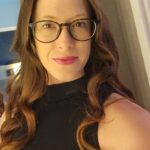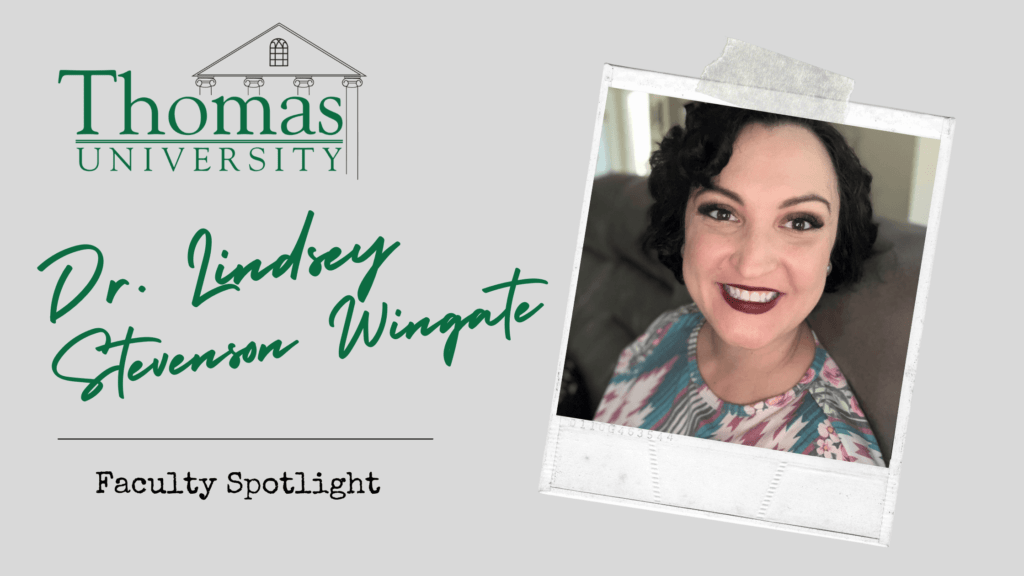Meet Thomas University’s passionate Dr. Lindsey Stevenson Wingate, Assistant Professor of Education, Program Director for Curriculum and Instruction and Content Area M.Eds.
What programs do you teach at Thomas University? What drew you to this field of study? What keeps you excited about it?
I currently teach and lead multiple courses in the majority of the programs we offer. This includes Content Areas (M.Eds.), M.Ed. in Curriculum and Instruction, Master of Arts in Teaching (M.A.T.), M.Ed. in Teacher Leadership, and our undergraduate teacher preparation program.
Additionally, I am Program Director for the Curriculum & Instruction Program, and Content Area M.Eds. While I have the opportunity to teach across all of these programs, most of my teaching time is dedicated to pedagogical courses in our teacher preparation programs.
I knew from a young age that I wanted to be a teacher. While my reasoning may have evolved over the years, my passion for education and working with various individuals never dwindled. When I was teaching high school in Florida, I was asked to present some of the teaching strategies I used with my social studies students to all faculty members. At this moment, I felt a light bulb go off and my desire to work with and train teachers was ignited.
How will your program better prepare/equip educators for the current climate they are facing? How will it help them tackle the challenges of COVID and post-COVID teaching?
Much like the rest of the world, Thomas University had to adapt to the challenges that the pandemic presented. This included how we prepared and supported our educators through these challenges. All of our education graduate programs, including curriculum and instruction, and content areas were already fully online so this was not a hurdle we had to face.
Instead, we focused on the current issues that many of our students faced in their classrooms. Our level of empathy increased as the number of unknowns continued to rise. We adapted assignments to ensure they still challenged our students and took into account the new landscape of education during the COVID-19 pandemic.
We also updated the literature and resources provided to students to include information related specifically to the pandemic and education. Class discourse shifted to include examinations of ways to navigate COVID and post-COVID teaching. As many schools shift back to some level of normalcy, much of what we do is still viewed through a post-COVID lens.
As new challenges arise, our programs will continue to make adjustments to ensure we support all of our students and give them the tools and skills needed to maneuver through the ever-changing climate in education successfully.
What attracted you to teach at Thomas University? What sets them apart?
Early on into my doctoral program, I knew that I wanted to work at a university that allowed me more time to teach and train educators. Thomas University has afforded me the opportunity to continue to follow my passion.
In addition to focusing on teaching, Thomas University was attractive to me for several other reasons. One of the first things I noted when I participated in the hiring process was how welcoming everyone was, especially the faculty in the Division of Education. From the beginning, it felt like home and where I would get to spend time improving education in Georgia with like-minded individuals.
Additionally, I was impressed by how open the university is to innovation and creativity; Thomas University wants to continue to grow and find ways to support all students. This mindset is very much in line with the direction I feel higher education should be aiming for.
What is your professional background as an educator?
Before obtaining a position at Thomas University, I spent my educational career in Central and North Florida. I attended a local community college and received an associate degree in history with a minor in education before transferring to the University of Florida. At the University of Florida, I obtained a bachelor’s in history with a minor in classical studies. After completing my bachelor’s degree, I earned a master’s in social studies education through University of Florida’s PROTEACH program.
Following graduation, I taught seventh-grade geography at a charter school in Orlando, Florida, before moving to Stockholm, Sweden, to tutor elementary students. After my contract in Sweden was finished, I taught several ninth through twelfth grade social studies subjects in Palm Bay, Florida. I spent several years at this high school before moving back to Gainesville, Florida, to complete my Ph.D. degree in curriculum and instruction with a focus on social studies education.
As a doctoral student and then-candidate, I taught several undergraduate and graduate courses in education before obtaining employment at Thomas University. Currently, I have been an assistant professor at Thomas University for four years and the program director for Curriculum & Instruction and Content Area M.Eds. for two years.
Tell us a little about yourself. Why did you become interested in education?
Whenever I was asked what I wanted to be when I grew up, I always said a teacher. My dreams ebbed and flowed as time went on, but I always ended up wanting to be a teacher. I wanted to find something that did not feel like a job because I enjoyed it so much. I was also quick to avoid a 9 a.m. to 5 p.m. schedule behind a desk every day.
As I volunteered more and more in educational settings throughout high school and my time at the local community college, I realized that I had found everything I was looking for in becoming a teacher. To this day, I have the biggest smile on my face every time I teach and work with students.
What would you tell prospective students considering your program about yourself? What’s something that students and colleagues should know about you?
As a professor, there are a few key things to know about me: I am empathetic, have a deep passion for teaching and equity, and have high expectations. One of my biggest goals is to see all my students be successful in the courses I teach and the programs I lead.
I want all students to also walk away with new perspectives and ideas to utilize with their students. With that desire for success comes an understanding that life can be challenging and unpredictable. Because of this, I remain understanding, flexible, and supportive.
While I maintain a level of empathy with all of my students, I also uphold high expectations because I believe empathy and high expectations can coexist beautifully if balanced with support and open communication. Additionally, I strive to ensure that equity is a focal point of the classes I lead and teach. As the lead of the diversity course within the Curriculum and Instruction Program, equity at the K-12 and higher education levels is one of my core values. I truly believe all students can be successful when provided the appropriate support and resources alongside having educators with an equity mindset.
What advice do you have for students interested in pursuing their graduate curriculum and instruction degree? How can people stand out in this field?
If a teacher wants to pursue a graduate degree in curriculum and instruction, I encourage them to consider their ultimate goals. What do they hope to accomplish with this degree? Focusing on those goals throughout the program can help motivate teachers when they face various struggles.
It is also essential that teachers entering this program discuss with their families and loved ones the level of dedication that will be required of them. The support of family and loved ones to navigate day-to-day and cheer them on can be instrumental in their success.
Lastly, I encourage teachers in this program to be open to new perspectives, ask questions to deepen their understanding, and soak it all in. The knowledge and experiences they gain from this program will benefit their students, colleagues, schools, and themselves for years to come.

